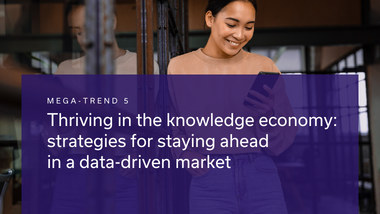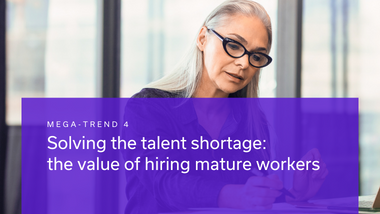Why return-to-work programmes are a win-win for businesses and people alike
Jennifer Jackson is Future Workforce Manager at UK bank TSB, looking after everything related to employer brand and planning how TSB hires the right talent for the future.
In her role, Jen has partnered with us at Resource Solutions for several years. We talked with her about her experience of working with us on Rejoin, our return-to-work programme for experienced professionals following a career break.
You’ve told us that one of the reasons you’re such an ally and advocate of our Rejoin programme is that you have first-hand experience of returning to work after a career break. What was that like?
I’ve had two maternity leaves in the last 10 years and took a year off each time. I’ve been lucky to have felt incredibly supported and secure in my role both times. I also took time away from work a couple of years ago when my husband was given the opportunity to work overseas through parental leave, and, once again, I felt 100% supported by my employer with my choices. So, yes, I’ve been through the process and the experience, and it’s made me appreciate the benefits of feeling supported and valued.
While some people choose to take a career break, for many others the time out of work might not be of our own choosing. It might be childcare responsibilities, or redundancy, or life events that demand we take time away. What was your experience like?
All my breaks were planned, and I was lucky. I felt supported, but I do remember announcing my second pregnancy after only recently being back from my first maternity leave and feeling rather anxious, so I know how that can feel. Thankfully, my concerns were unfounded.
Our organisation was going through a lot of change at the time, as we were finding our feet and separating the business from a partner bank, but I never felt obliged to stay in touch or use all the KIT (Keeping In Touch) days. I wanted to enjoy the time with my babies as not going back to work wasn’t an option. I certainly worried about how I would juggle the work-life balance element. Things like having to work late or when you get a call from your childcare provider to say your child is poorly just minutes before a big presentation or something similar. So, I can really empathise; I think most new parents do.
How much do you think the perception of taking career breaks has changed? Has the workplace narrative changed?
The key change has been in managing work-life balance and having flexibility, and I think the pandemic has helped with the option to work from home. Again, I have been lucky, in that I have worked one day from home for the last eight years - but that wasn’t common practice back then. Now, the conversation about working home probably won’t be so difficult. My own experience has been that TSB, my employer, is incredibly supportive – they offer Family Buddies for those off on parental leave, but we also have a Carers policy for those who need time way for caring responsibilities, with paid or unpaid options to do this. It’s really important for us as an employer to recognise that we have lots of great people working for us, and that we need to be flexible to their personal needs to retain the talent – it works both ways.
Taking everything together, what would you say was the hardest decision you had to make when returning to the workplace?
I would have to say striking the right balance when wanting to reduce my hours. I wanted to work enough days that I felt would help me with my desire to have a career, but I also wanted to be there for my children. It’s the classic work-life balance dilemma. The financial side of things is also a big part of the decision-making process. There’s so much support required – those day trips to London need to be planned out carefully for childcare, and for your partner’s work commitments. It’s not easy, but TSB has always been flexible to allow me to manage both work and home life.
It’s evident that a flexible employer makes all the difference. You were confident that options were available to you, and then could work out what worked best for both you and your employer. And that’s the impact we hope Rejoin will have – by sharing our findings and insights with clients we are hoping that we can begin to inform and affect more open conversations.
That’s why I wanted to share my support for your Rejoin programme. The job market is so difficult right now because of the pandemic, so any additional support to help people prepare for returning to work is worthwhile.
TSB are supportive of programmes that encourage people back to the workplace, like Rejoin. We’ve had success with the Women Returner programme, an initiative based in Scotland, which recognised that being out of the workplace for a long period of time doesn’t mean you don’t have the required skills and talent – quite the opposite, in fact. We’ve been really clear about creating a truly inclusive workplace that reflects the UK working age population, and this includes ensuring we have a strong female representation in senior positions. Return-to-work programmes like Rejoin will very much be part of the various channels we’ll look at to support us with that.
Find out more about Resource Solutions’ return-to-work programme with a difference, Rejoin.












